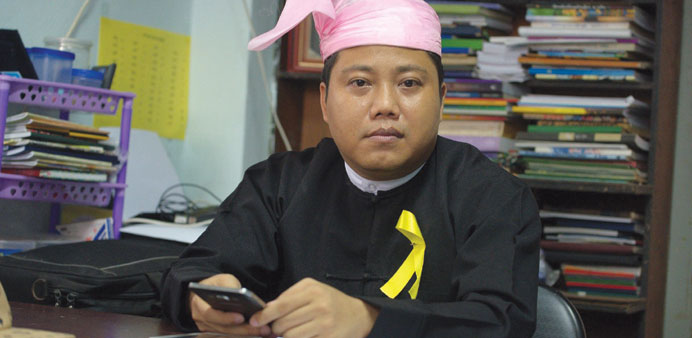Myanmar lawyer Kyaw Myo Thu poses for a picture wearing a yellow ribbon, a new symbol of defiance, as part of a campaign in Yangon yesterday.
AFP/Yangon
The Myanmar lawyer poses solemnly for his social media picture wearing a ribbon pinned prominently to his jacket —a new symbol of defiance as public servants increasingly voice opposition to the military’s dominance of public services.
While Myanmar’s former junta has loosened its grip on political power, handing over to a quasi-civilian regime in 2011, networks of retired army officers still riddle state administration, which has for years been hampered by corruption and chronic underfunding. But there are signs that this is increasingly being challenged as reforms — and the growing power of social media — emboldens disgruntled professionals to speak out against old power structures as the country heads towards crucial November elections.
Following in the footsteps of a successful “black ribbon” selfie campaign by medical staff in recent weeks, lawyers in several major cities have started pinning yellow ribbons to their official black jackets and launched an online campaign in protest at army appointments in the Supreme Court. “We want to show that we do not support the appointment of military officers in the judiciary,” said Kyaw Myo Thu, a 36 year-old lawyer, who has joined the growing campaign in Yangon this week.
He said that the continued recruitment of former military officers in positions of power would only serve to reinforce the widespread belief that justice was at the whim of the elite in Myanmar.
The campaign gathered steam quickly despite Supreme Court denials that they had planned any new military appointments.
The court in December announced a sweeping roadmap to reform the judiciary. But campaigners have raised the alarm over high profile cases in recent months including the detention of dozens of student protesters.
The sprawling civil service is packed with retired officers from the feared “tatmadaw”, or army, which brutally crushed any dissent during its decades in power.
But reforms under President Thein Sein, a former general, have thrown open communications, with the media unshackled from draconian censorship and the rapid growth of Internet access fuelled by cheap mobile phones. Medical staff took to social media in July posting pictures wearing black ribbons in protest at the appointment of military doctors and retired officers in the ministry of health and at Yangon’s main public hospital.
The campaign was apparently a success, with a promise from the ministry not to appoint any former soldiers in the future.
Professionals are now finding their voice to protest publicly, said Myanmar political analyst Khin Zaw Win.
“The ‘militarisation’ has been an entrenched pattern for decades and had contributed significantly to poor morale and inefficiency in all ministries. And yes, the military is feeling the heat,” he said.

